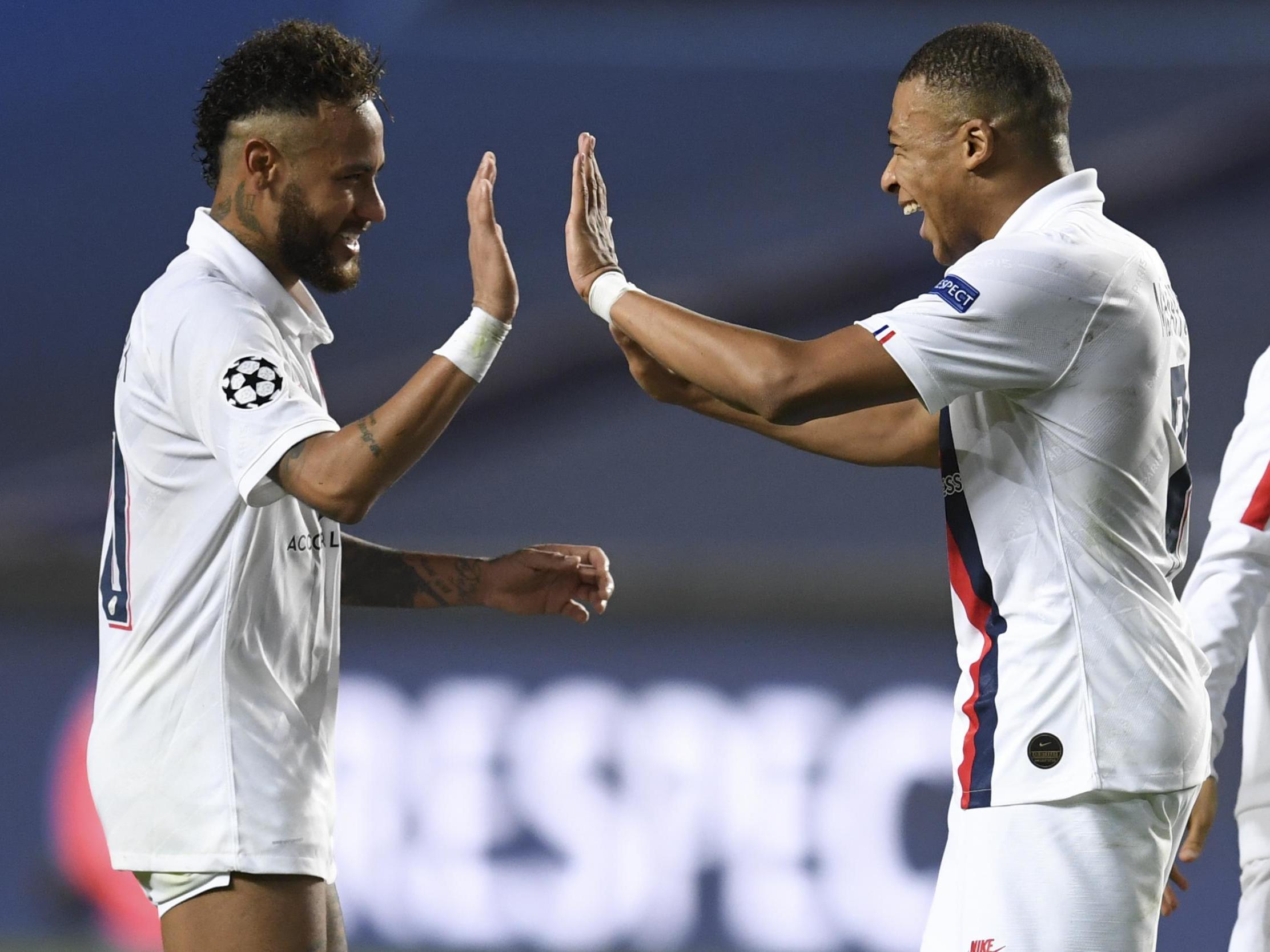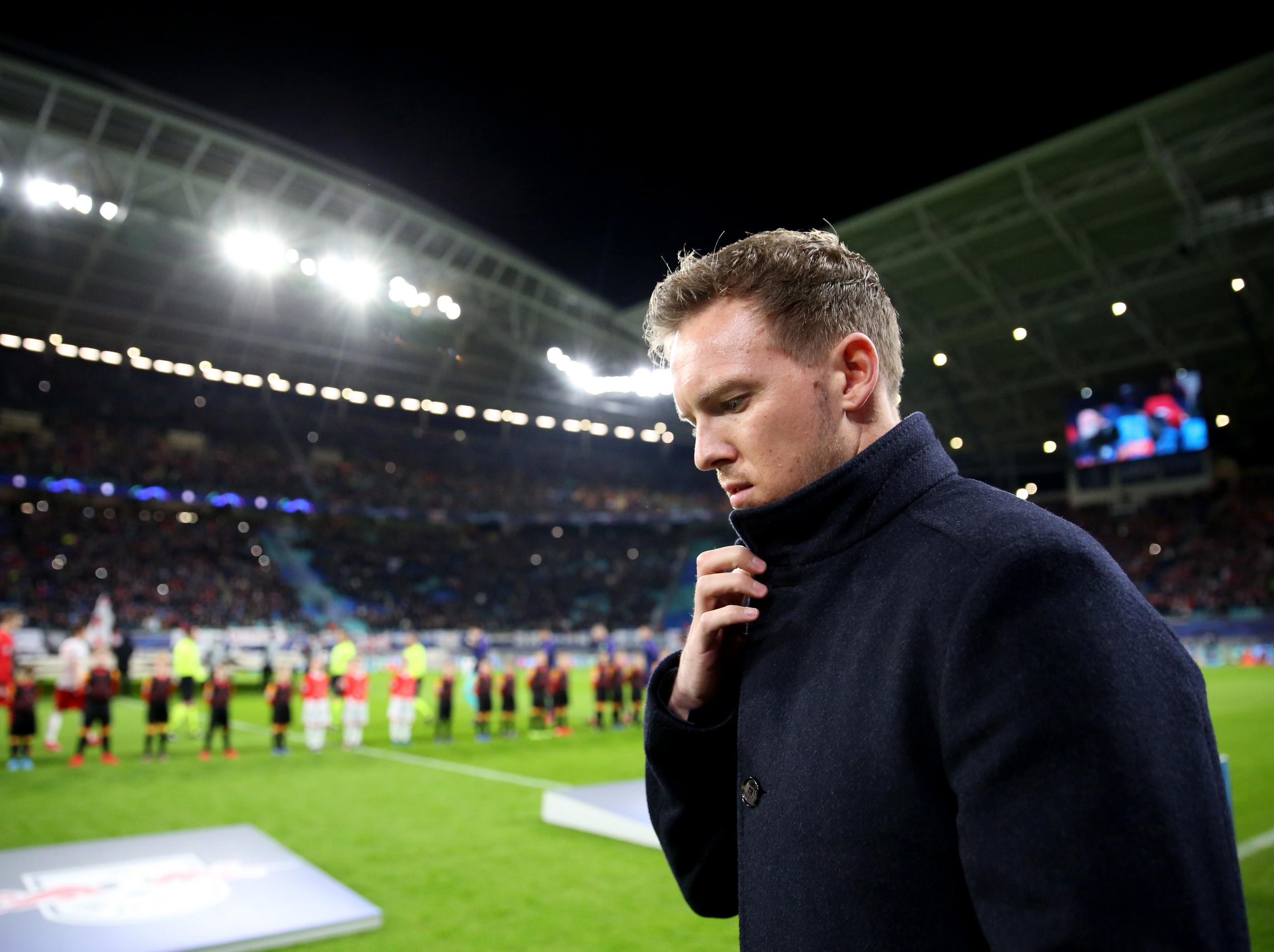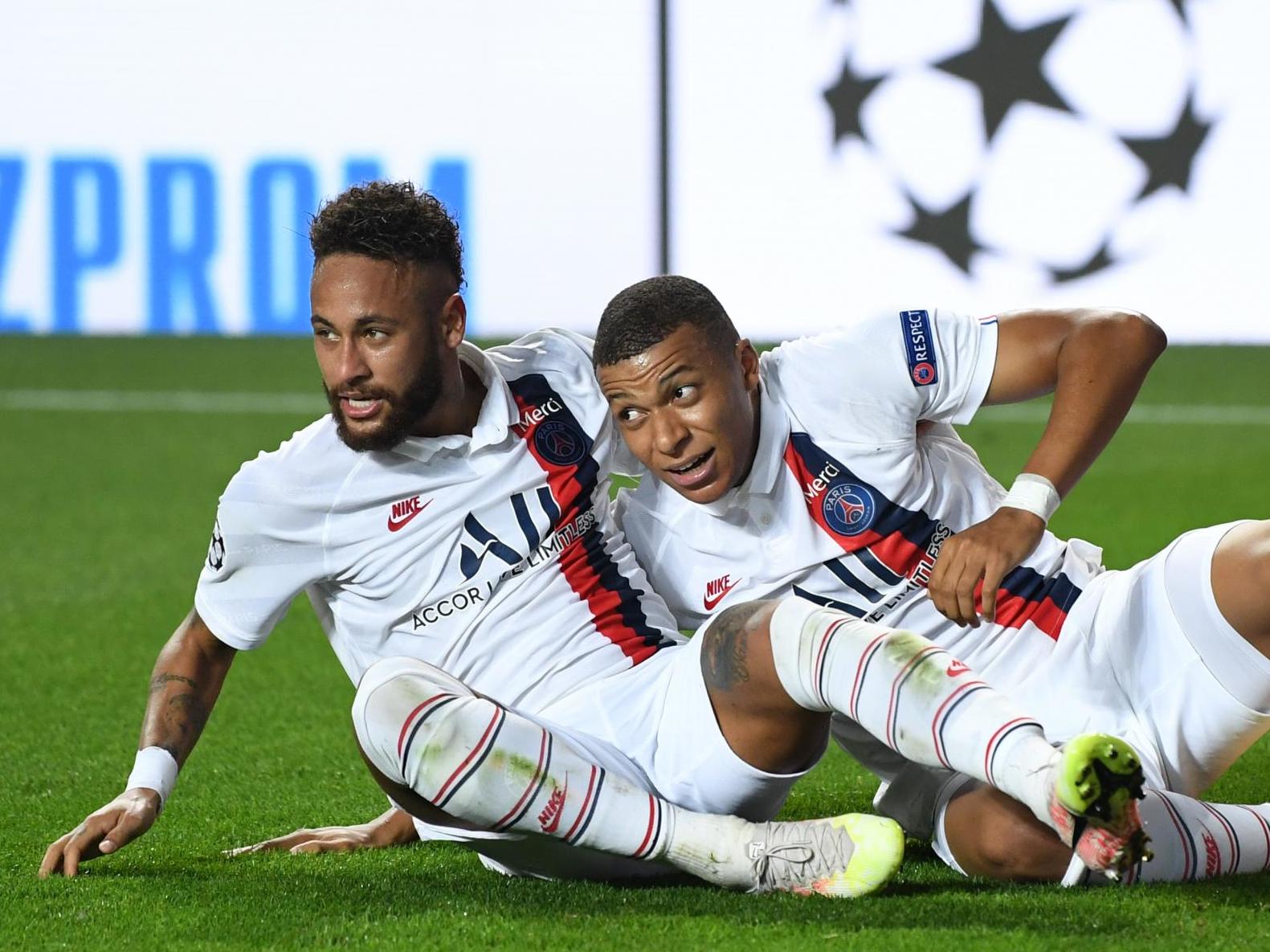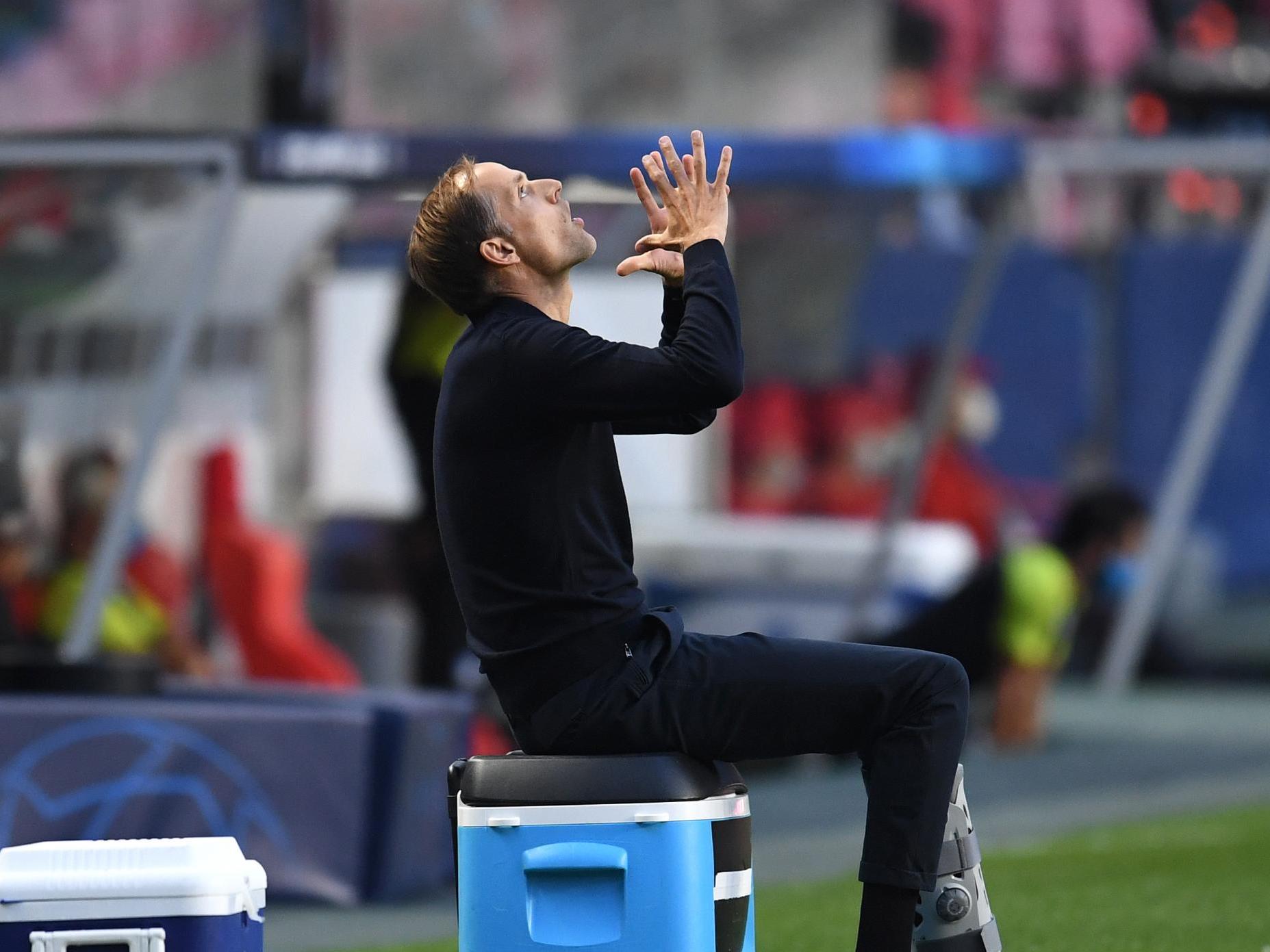RB Leipzig’s swarm take on PSG’s stars as ideology meets individuals in Champions League semi-final
Neither side has won the Champions League before, but one of them is guaranteed a spot in Sunday’s final against either Bayern Munich or Lyon

Your support helps us to tell the story
From reproductive rights to climate change to Big Tech, The Independent is on the ground when the story is developing. Whether it's investigating the financials of Elon Musk's pro-Trump PAC or producing our latest documentary, 'The A Word', which shines a light on the American women fighting for reproductive rights, we know how important it is to parse out the facts from the messaging.
At such a critical moment in US history, we need reporters on the ground. Your donation allows us to keep sending journalists to speak to both sides of the story.
The Independent is trusted by Americans across the entire political spectrum. And unlike many other quality news outlets, we choose not to lock Americans out of our reporting and analysis with paywalls. We believe quality journalism should be available to everyone, paid for by those who can afford it.
Your support makes all the difference.It is a contrast that could yet decide the contest. While RB Leipzig’s players have rehearsed counter-pressing drills so many times they’re second nature, there are some Paris Saint-Germain players who just shut off when the prospect comes up. This isn’t what they signed up for.
Julian Nagelsmann thereby enjoys total commitment to his idea of play, while Thomas Tuchel must compromise on his.
The latter is perhaps the price of having much greater individual talent, who can decide the game in an instant.
The difference may not just decide Tuesday’s semi-final but could well point to a new dynamic in the game, as many super clubs start to adjust to the next stage of their era.
It was something suggested by PSG’s quarter-final against Atalanta. The Italian side ran such a wealthier club so close with the kind of rigorous plan that the French champions can’t really implement. Atalanta ultimately only fell short because of inferior individual talent. What can you do when the opposition brings on Kylian Mbappe?
Leipzig have more talent than Atalanta, but also an even deeper-rooted idea.
It is possible that this is a potential advantage for clubs outside the elite, as they try to compete with the super clubs. They may be able to implement tight plans in a way that is actually impossible for many super clubs. It may be especially difficult for PSG. And it may be especially advantageous for Leipzig.
That is down to the unique – and controversial – history of the Bundesliga club.
While there are rightful criticisms of the entire Red Bull project, the blank canvas offered by just buying fifth-tier SVV Markranstadt in 2009 meant they could construct an idealised club from scratch, at least in a purely football sense.
They eventually went to the perfect figure for that, in Ralf Rangnick. That was in 2012, around the same time as Qatar took over PSG, which only sharpens the contrast. It’s little wonder Manchester United have consulted with Rangnick in trying to enhance their approach, or that AC Milan considered an overhaul under the German. Alexander Zorniger was Rangnick’s first appointment at Leipzig in 2012, overseeing their first series of promotions, and explains how an ideology is set.
“Ralf Rangnick is for me one of the godfathers of modern coaching,” Zorniger tells The Independent. “It’s called Red Bull football, but it’s Ralf Rangnick football. Nobody in Salzburg, or Leipzig, or New York played in the way Red Bull is playing now before Rangnick came.

“The whole idea is about convincing people – convincing players, coaches, spectators. It’s very much about mentality, emotions, and having so many actions.
“If you play that once, you will never want to play a different way of football, because it’s so exciting, so entertaining, so unique to handling every phase of the game and every second of the game.”
Zorniger says his very first moments with Rangnick were instructive.
“I remember clearly his first question. I was actually going to stay at my old club, Sonnenhof, but he was really convincing in what he was saying and insisted we had to meet. So we met the next day and the first question was: ‘Are you playing with the ball, or against the ball?’ I said ‘against the ball’, and that was the foundation of everything we did. We sat together for four hours, talking about positions, how the perfect move should look, trying to find as many puzzle pieces for his picture as possible.”
So much of what Leipzig do now follows from those initial meetings, if with obvious evolution. “Ralph ensured there is someone at the club who is always monitoring the international development of football, and looking at how each element of the game is developing and improving, to see what you need to do in the modern game to be successful.”
The counter-press is right now the dominant influence, and is best practised in Germany.

Leipzig naturally look for managers who fit this approach, to the point they have almost become a coaching school. All of Southampton’s Ralph Hasenhuttl, Borussia Monchengladbach’s Marco Rose and Bayern Munich assistant Danny Rohl came through the club. Players like Joshua Kimmich have credited Rohl with implementing the counter-pressing approach that has helped transform and complete Bayern since their January upsurge.
Against that, since the start of this Qatari era, PSG have gone through a series of totally different coaches. There are few similarities between Carlo Ancelotti, Laurent Blanc, Unai Emery and Thomas Tuchel. That corresponds to a squad that never feels like it is constructed to any specific design. Some signings will fit what is required, of course, but it’s only ever to a short-term plan. Rather than a coach imposing an idea, as should be the ideal, any coach must work around the players.
Hence you have stories like Emery asking Neymar to do stretches, only for the Brazilian to refuse and indulge in some shooting practice instead. While there have been fair questions about Emery’s charisma, one manager who knows him well told The Independent it seemed “impossible to impose any kind of idea on PSG’s stars – they do as they please”.
This is why a coach as dogmatic as Tuchel seemed an odd fit, although it is said he realised from the off that a key to the job is facilitating Neymar. That has meant the German manager somewhat going against his own nature, too, but it’s impossible not to think there’s more give on his side.
As one figure familiar with the club’s internal workings said: “Can you really imagine them rigorously going through counter-pressing drills?”
Put all this in the context of Thomas Meunier’s recent comments.
“When I was at Bruges, we’d celebrate birthdays by playing darts or pool in a bar, but here it’s just outrageous,” the Belgian said. “That just reflects the club: hire a palace, hire a building, parties with hundreds of people. That’s when you see that they’re more than footballers; they’re stars.”
That is a world away from the scenes at Leipzig’s training ground, where the work of psychologist Ivan Pavlov is referenced.
“One of the key principles for us was ‘attacking the nerves’, so you are creating exercises that are more and more difficult,” Zorniger explains. “It’s about putting the players under pressure, giving them thinking tasks, forcing them to make a decision. It’s based on classical conditioning, like with Pavlov’s dog. That is what everything is based on, that you are thinking faster than the opponent, so you can handle situations faster than the opponent. The idea is it becomes almost like slow motion for you.
“What to do when you lose the ball becomes second nature.
“That is one of the key points of our training work. One is with the ball, one against. Against the ball, the best chance to win it back is within five seconds. With the ball, the best chance to create a goal chance is within 10 seconds. That is not something Ralf just said, it comes from a lot of scientific analysis. There is a direct relation between sprinting against the ball and winning it back. That is what we told the players, using video analysis and a countdown clock, to show them situations where the action is changing.”
One source who knows Tuchel just can’t see similar at PSG.

“You can’t build a vision if all the players are not willing to commit to it. Some of them have agents on their back, complaining that they are asked to do something that means a team-mate will shine, even though you will all shine because of the result of the team; or complaining about sprinting when working against the ball, because it means they are further away from scoring. It is really, really difficult to convince a player who has been a multiple champion.”
Such thinking actually conditions RB’s recruitment. They focus on young players signing their first or second major contracts, as they’re hungry and malleable.
The offset of this is that PSG do have a series of mature characters, who are known for discussing tactics among themselves, and intelligently figuring out solutions on the pitch. There is a lot to be said for that, especially in the intensity of knockout games. Manchester City could have done with it on Saturday.
The sheer extent of the individual quality should not be discounted either.
The more energy that players like Neymar and Kylian Mbappe have for when they get on the ball, the more likely they are to do something sensational. That can be even more important in one-off games like this. That is what told against Atalanta.
Leipzig, like the Italians, and no matter what their tactical vision, don’t have that sort of quality. It has been a source of discussion in the club’s internal coaching conferences. There has been heated debate about the emphasis on playing with the ball or “against it”. Hasenhuttl is said to have gotten especially invested.
Zorniger believes this has been why Nagelsmann has been so important to the club. While PSG have a critical mass of talent, the Leipzig coach seeks to create an overload of movements. There is an awful lot going on when RB are playing, and so much movement.
“With the ball, there was a lot of space for development,” Zorniger says. “This is what Nagelsmann did. He created principles to give the players so they can develop their game with the ball, which were also based on their individual quality.
“They lost Timo Werner but created more chances than a lot of international top clubs against Atletico Madrid. I don’t have to tell you how difficult that is.
“This is also one of the weaknesses: If on one day the complete team isn’t functioning, everything will crack. If you are defending and not covered by your team-mates, you are one-on-one. And in one-on-one, one mistake can be the one mistake too much. Neymar can punish this.
“We are talking about swarm behaviour, swarm intelligence.”
That’s what one side of this game is.
In a broader sense, it is a state against a brand franchise.
In a football sense, it is an intensely implemented tactical idea against individual innovation, the swarm against the stars.
Join our commenting forum
Join thought-provoking conversations, follow other Independent readers and see their replies
Comments